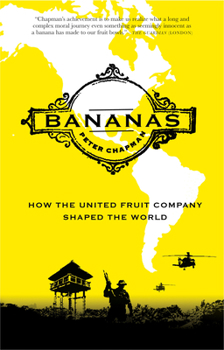Bananas!: How The United Fruit Company Shaped the World
Select Format
Select Condition 
Book Overview
In this compelling history of the United Fruit Company, Financial Times writer Peter Chapman weaves a dramatic tale of big business, deceit, and violence, exploring the origins of arguably one of the most controversial global corporations ever, and the ways in which their pioneering example set the precedent for the institutionalized greed of today's multinational companies.
The story has its source in United Fruit's nineteenth-century beginnings in the jungles of Costa Rica. What follows is a damning examination of the company's policies: from the marketing of the banana as the first fast food, to the company's involvement in an invasion of Honduras, a massacre in Colombia, and a bloody coup in Guatemala. Along the way the company fostered covert links with U.S. power brokers such as Richard Nixon and CIA operative Howard Hunt, manipulated the press in new, and stoked the revolutionary ire of Che Guevara and Fidel Castro.
From the exploited banana republics of Central America to the concrete jungle of New York City, Peter Chapman's Bananas is a lively and insightful cultural history of the coveted yellow fruit, as well as a gripping narrative about the infamous rise and fall of the United Fruit Company.
The story has its source in United Fruit's nineteenth-century beginnings in the jungles of Costa Rica. What follows is a damning examination of the company's policies: from the marketing of the banana as the first fast food, to the company's involvement in an invasion of Honduras, a massacre in Colombia, and a bloody coup in Guatemala. Along the way the company fostered covert links with U.S. power brokers such as Richard Nixon and CIA operative Howard Hunt, manipulated the press in new, and stoked the revolutionary ire of Che Guevara and Fidel Castro.
From the exploited banana republics of Central America to the concrete jungle of New York City, Peter Chapman's Bananas is a lively and insightful cultural history of the coveted yellow fruit, as well as a gripping narrative about the infamous rise and fall of the United Fruit Company.
Format:Paperback
Language:English
ISBN:1847671942
ISBN13:9781847671943
Release Date:July 2009
Publisher:Canongate Us
Length:240 Pages
Weight:0.48 lbs.
Dimensions:0.7" x 5.0" x 7.8"













